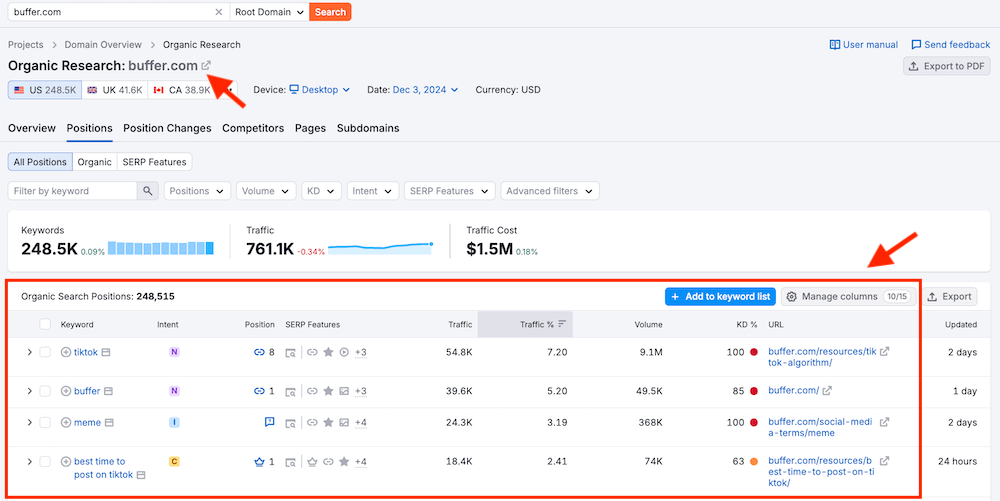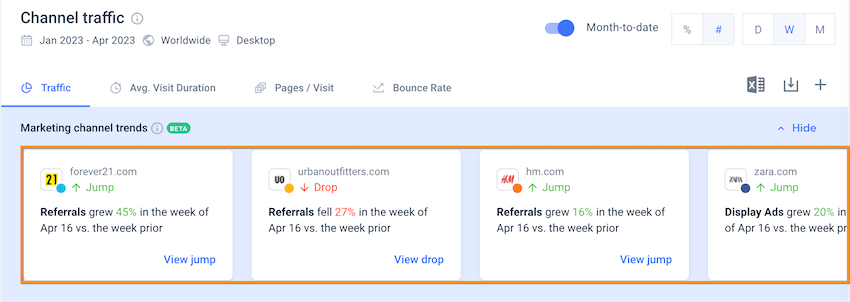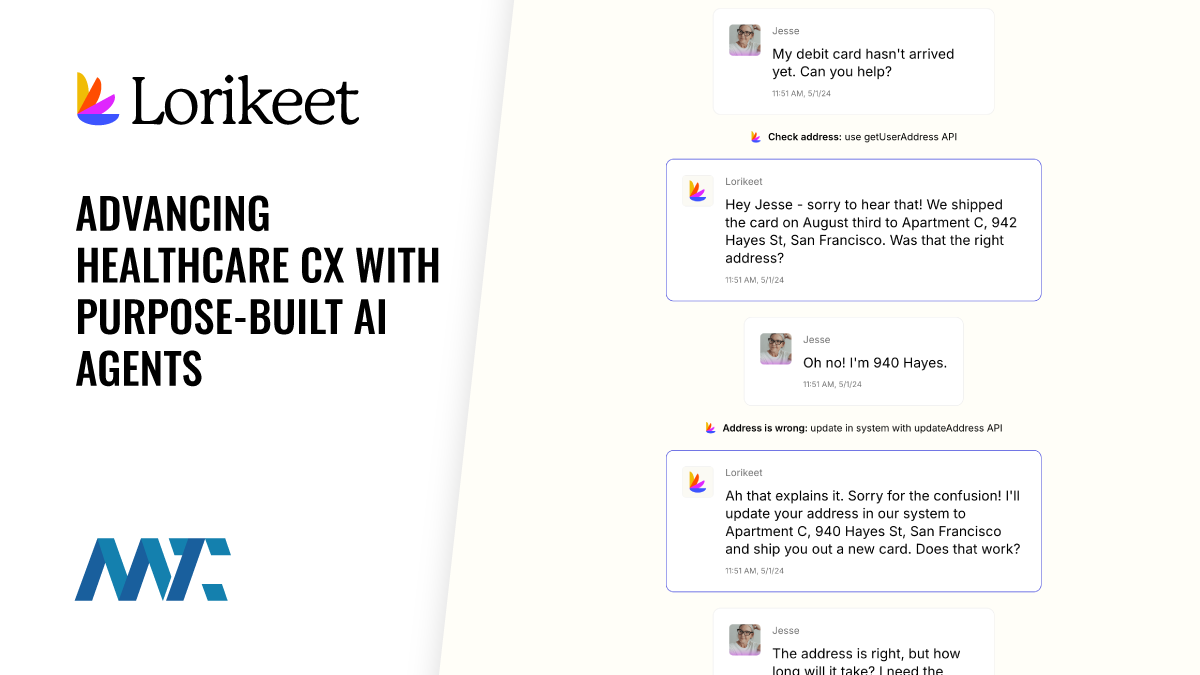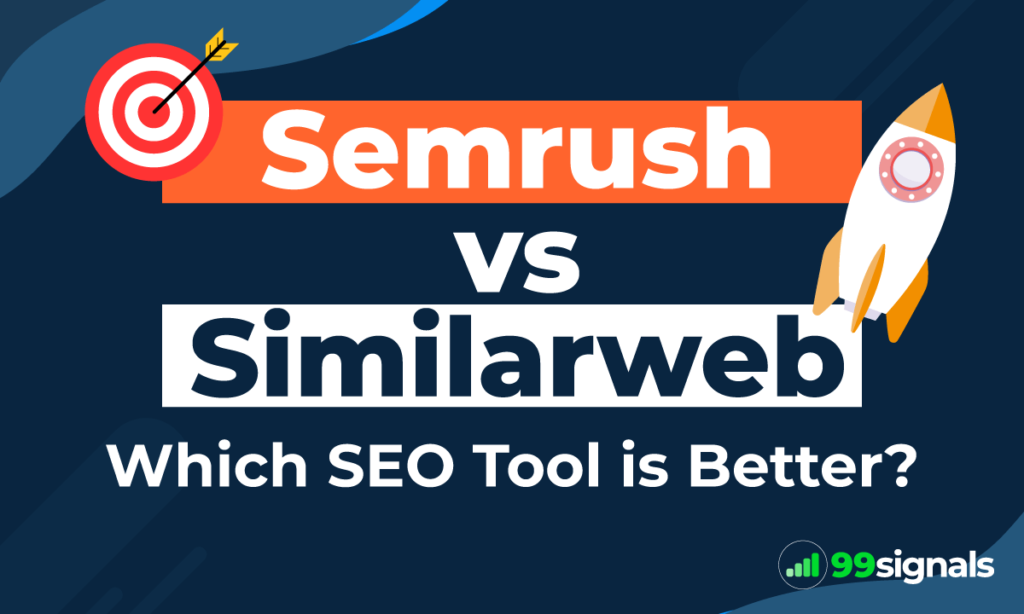
Semrush vs Similarweb: Which SEO Tool is Better?
With SEO and online marketing going through incredible complexity in the last few months, choosing the right SEO tools has become even more crucial.
Semrush and Similarweb are two of the most popular SEO platforms that offer powerful features but serve slightly different purposes.
While
In this detailed comparison between
By the end of the article, you’ll be able to make an informed decision on which tool you should use to supercharge your SEO.
Let’s dive in.
Side note: To get the most out of this
- Sign up for a 2-week free trial of Semrush Pro
- Sign up for a free trial of Similarweb
Table of Contents
Semrush: An Overview
Since its launch in 2008,
Whether you’re working on an organic campaign or optimizing your paid strategy,
Key Features:
- Comprehensive Keyword Research: Tools like the Keyword Overview report, Keyword Magic Tool, and Keyword Gap Tool allow users to explore untapped keyword opportunities.
- SEO Site Audit: Identifies technical issues that could hurt search rankings, such as crawl errors and duplicate content.
- Competitor Research Toolkit: Helps you uncover competitors‘ top-performing strategies, including traffic sources, top pages, keyword rankings, backlink profiles, and paid ad campaigns.
- Content Marketing Toolkit: Helps you plan, track, and optimize your content campaigns.
What makes
This modular layout makes it easy for you to switch between different features and functionalities without feeling overwhelmed.
After all, when you’re spending over $100 in an SEO tool, you want something that works seamlessly and doesn’t add to your frustration.
With
Similarweb: An Overview
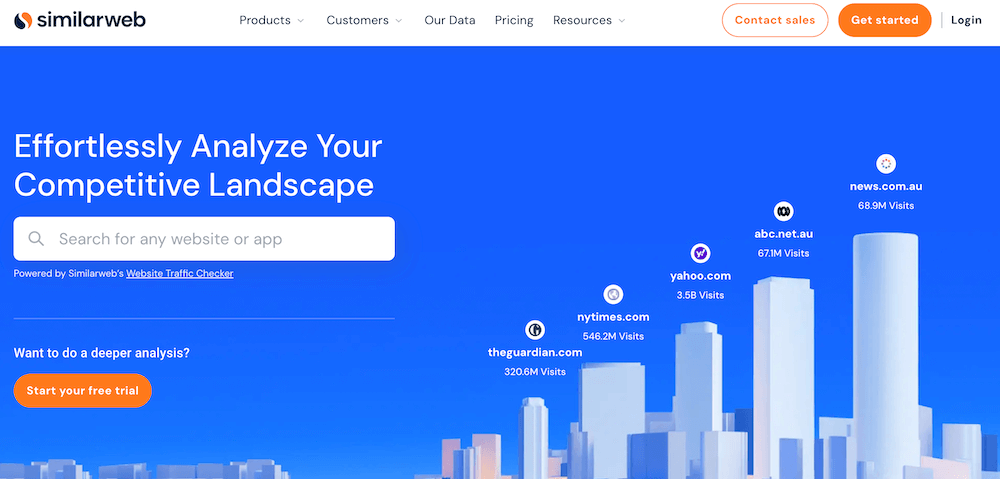
Founded in 2009, Similarweb is perhaps best known for offering macro-level insights.
This means the tool helps you see the bigger picture, like tracking website traffic trends, audience behavior, and market performance across industries.
You can use it to benchmark your website’s online performance against competitors and analyze market trends.
Unlike
Key Features:
- Traffic Overview: Analyze where your competitors‘ traffic comes from and which channels are driving their growth.
- Audience Insights: Understand visitor demographics, geographic distribution, and behavior patterns.
- Industry Benchmarking: Get a bird’s-eye view of market trends, allowing you to make data-driven decisions.
- Referral Traffic Analysis: Identify which partners and websites are sending traffic to your competitors.
When it comes to its interface, Similarweb focuses on simplicity and usability.
With its visually engaging dashboards, you can quickly pull insights for presentations or strategy planning—and save yourself a ton of time in the process.
Semrush vs Similarweb: Detailed Comparison
In this section, we will compare
Keyword Research
Semrush
When it comes to keyword research,
But the real standout in
You can filter keyword results by keyword difficulty, intent, and SERP features.
For instance, when you enter „small business“ into the search bar, you’ll receive thousands of variations, including long-tail keywords and question-based keywords like „How to start a small business,“ alongside important keyword metrics like search volume, intent, search trend, and keyword difficulty (KD%).
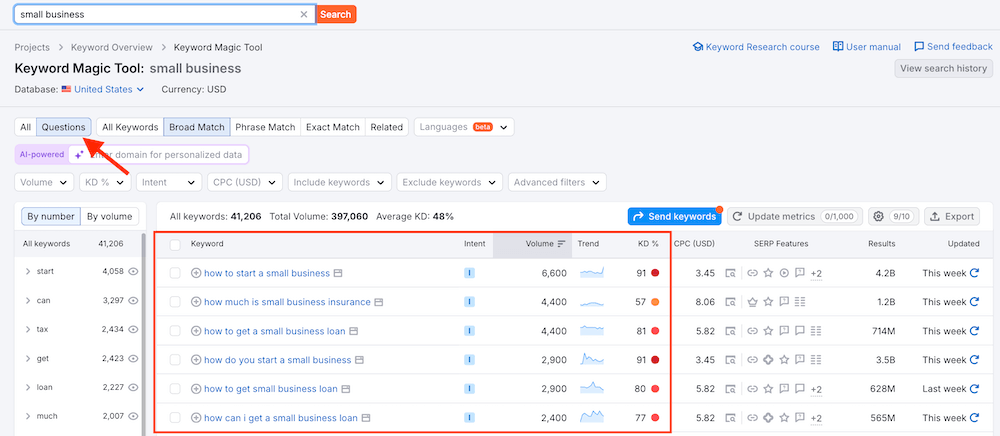
Then you have
You just need to enter a competitor’s domain to uncover the keywords they rank for, their positions, and the estimated organic traffic they generate for each keyword.
In other words, it helps you determine which keywords are driving traffic to your competitors, revealing untapped opportunities to optimize your own SEO strategy and refine your content plan.
And guess what? This is just the tip of the iceberg when it comes to
With tools like Keyword Strategy Builder and Organic Traffic Insights, you can unlock deeper insights, refine your strategy, and identify high-impact keywords that can drive more traffic to your site and boost your search rankings.
Learn how to make the most of
Similarweb
Similarweb does offer keyword insights, but its functionality is somewhat limited compared to
The keyword research tool gets the basics right. It can help you identify popular search terms and trends, but it lacks the depth and advanced features that make
If you’re just dipping your toes into keyword research, Similarweb might do the job. But for anything more detailed, like uncovering long-tail keywords or analyzing competitive gaps, you’ll probably find yourself wanting more.
That said, Similarweb does fairly well when trying to show what keywords drive traffic to competing websites.
For instance, when you enter a competitor domain into the search box, the tool reveals their top-performing organic and paid keywords, as well as the percentage of traffic each keyword contributes.
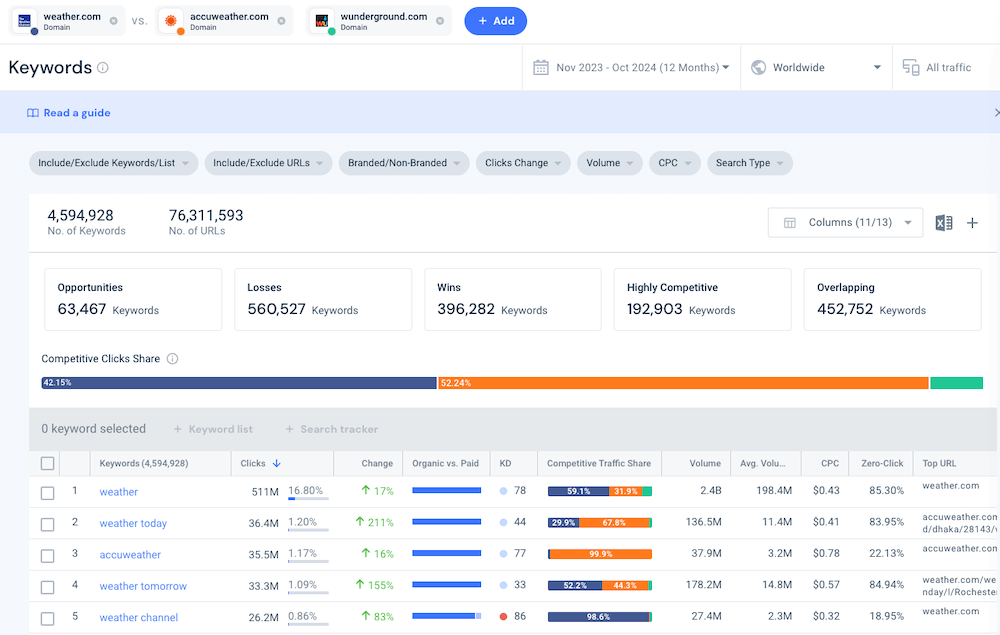
However, Similarweb lacks advanced filtering options and doesn’t offer tools for grouping keywords into clusters, making it less suitable for robust content planning.
Verdict:
Competitor Research
Semrush
Competitor analysis is one of
With the Domain Overview tool, you can compare multiple domains side-by-side, analyzing traffic trends, top-performing keywords, and backlink profiles.
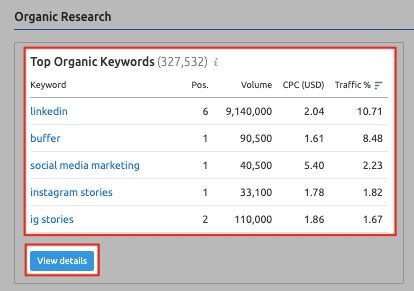
The Keyword Gap Tool further highlights keywords your competitors rank for that you may be missing.
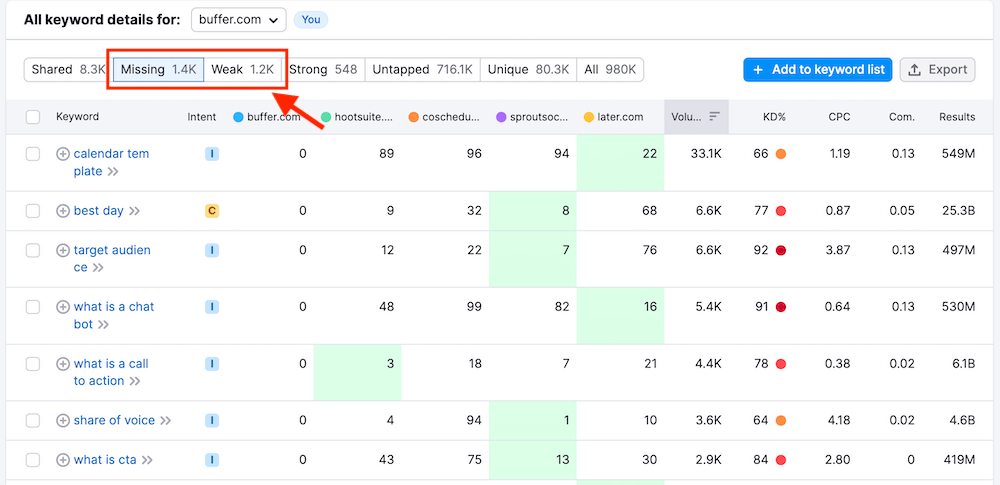
A unique feature is
You can use
This insight helps you adapt your strategy in real-time.
Recommended reading: 6 Powerful Ways to Use Semrush to Crush Your Competition
Similarweb
Similarweb approaches competitor research differently. Unlike
While it lacks a focused competitor research section, it provides a comprehensive view of competitor traffic sources, audience behavior, and market trends within this module.
Similarweb’s Website Analysis tool allows you to analyze any website’s audience demographics and channel traffic performance.
For example, you can quickly track fluctuations and spot traffic trends across your competitor’s key marketing channels.
The Audience Overlap feature is another highlight, showing how your audience overlaps with that of competitors.
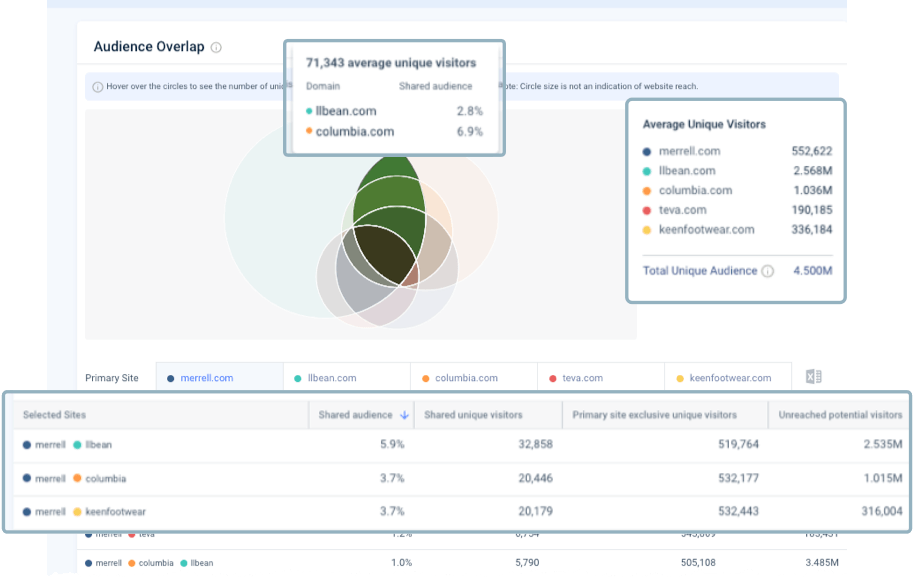
Verdict: While Similarweb does a great job in audience and traffic analysis,
Backlink Analysis
Semrush
Despite numerous Google algorithm updates over the years, backlinks remain one of the most influential ranking signals.
Boasting the largest backlink index among all prominent SEO analysis tools,
Its Backlink Analytics Tool provides data on referring domains, anchor texts, and link building opportunities.
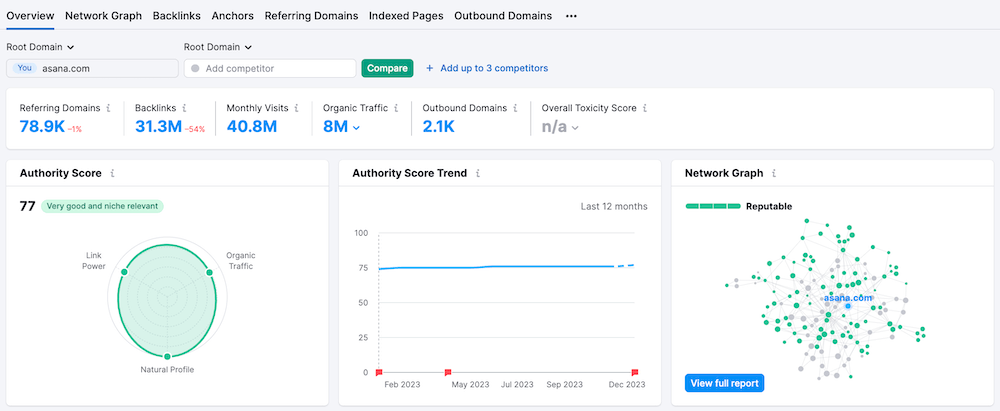
You can also compare your backlink profile against competitors using the Backlink Gap Tool.
For instance, if your competitors are gaining backlinks from high-authority websites, you can identify and replicate their strategies.
Additionally,
Recommended reading: How to Build Backlinks with
Similarweb
Similarweb offers limited backlink insights.
While it can identify traffic-driving backlinks to competitors, it doesn’t provide actionable data like domain authority or anchor text details.
Verdict:
Traffic Analytics
Semrush
Semrush’s Traffic Analytics tool provides a detailed breakdown of traffic sources, user engagement metrics, and audience geography.
This tool is especially useful for understanding user behavior, such as bounce rates and pages per session for a specific website.

For example, analyzing competitor traffic might reveal that a significant portion comes from referral sources, prompting you to focus on partnership outreach.
That said,
While you can get traffic insights for any website from
On the other hand, the traffic data generated via Domain Analytics are purely estimations based on keyword positions and their estimated traffic.
Recommended reading: The Ultimate Guide to Semrush Traffic Analytics
Similarweb
Traffic analytics is where Similarweb shines. Its granular insights into traffic channels (e.g., search, social, direct) are accompanied by detailed breakdowns of geographic locations and user demographics.
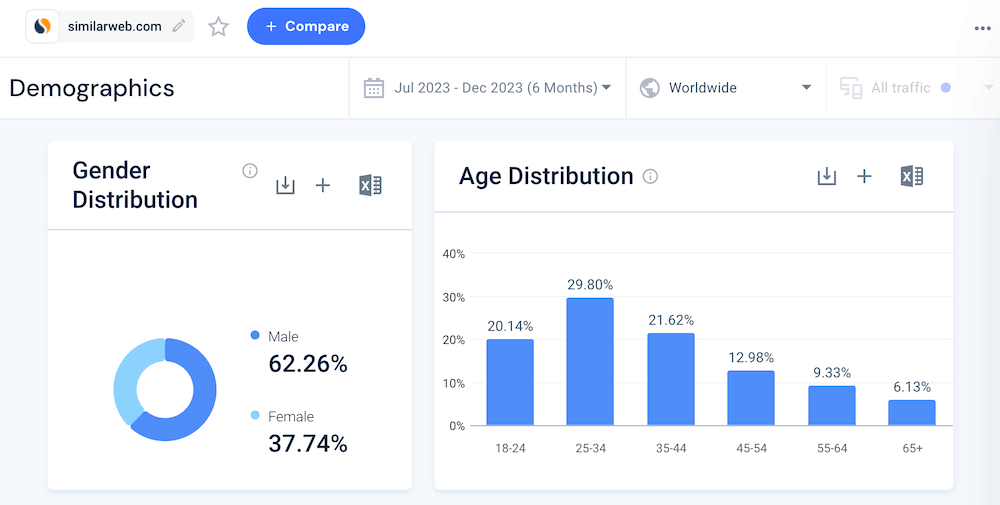
For instance, you can see how much traffic comes from mobile vs. desktop devices, or which regions contribute the most to a competitor’s traffic.
Whether you’re analyzing a direct competitor or exploring a new market, Similarweb’s traffic analytics make it easy to spot opportunities and adapt your approach.
Verdict: While Similarweb offers excellent visualizations and broad insights into traffic channels,
Technical SEO
Semrush
When it comes to technical SEO,
Semrush’s Site Audit tool offers a comprehensive evaluation of your website, scanning for all the major technical and on-page SEO issues that may be affecting your site’s rankings.
These include crawl errors, HTTPS implementation, page speed problems, duplicate content, and broken links. The tool categorizes issues into errors, warnings, and notices, making it easier to prioritize fixes that will have the most significant impact on your site’s performance.
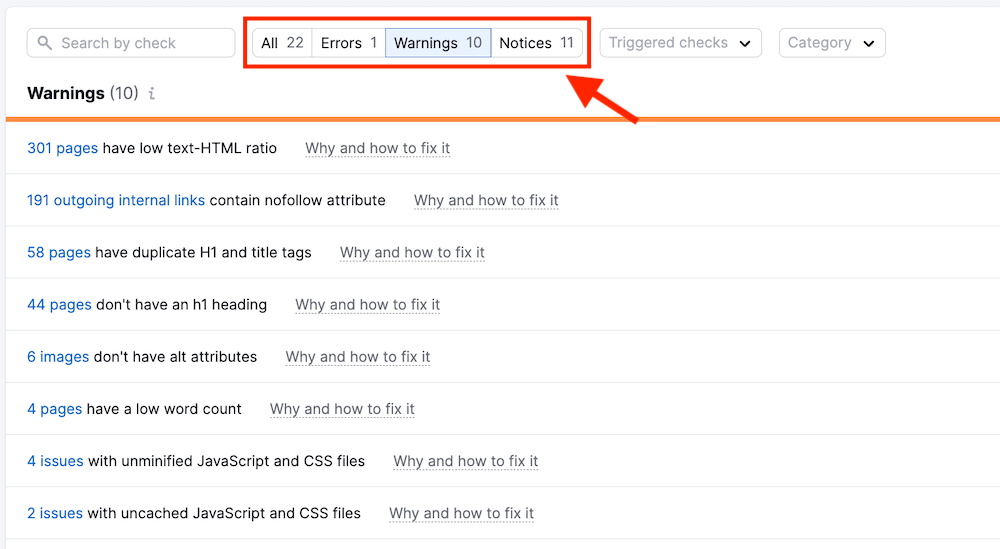
A standout feature of
Additionally, it provides actionable recommendations with step-by-step guidance to resolve issues, making it suitable for beginners and experts alike.
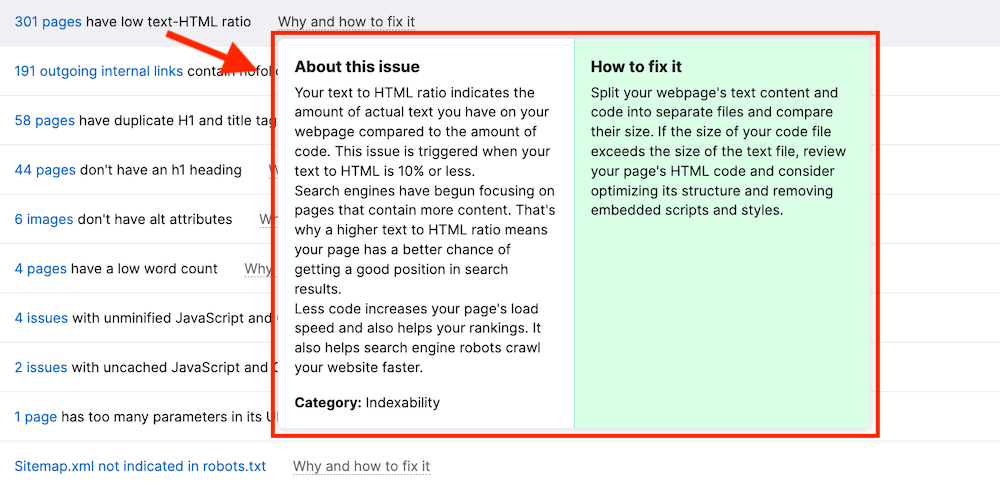
For larger websites,
Recommended reading: Semrush Site Audit: 10 Most Overlooked Features
Similarweb
Similarweb offers only basic technical SEO capabilities. Its features are limited to surface-level insights, such as identifying broken links and some page performance metrics.
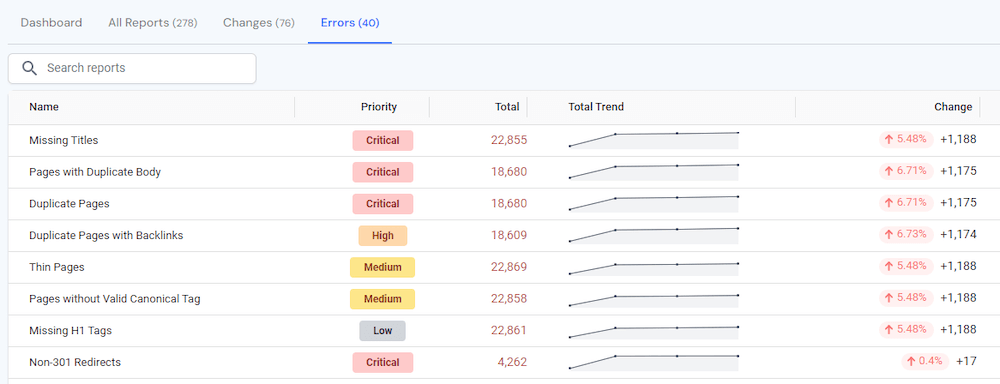
Unlike
If you need detailed technical SEO data analysis, Similarweb may not be the best choice.
Verdict:
Ease of Use
Both tools are user-friendly, but their designs reflect their primary focus areas.
Semrush’s interface is geared toward SEO professionals, with tools grouped by category for seamless navigation.
Similarweb’s interface, while visually appealing, is optimized for traffic analysis and market research.
Verdict:
Customer Support
Semrush offers a wide range of support options, including live chat, email, and a comprehensive knowledge base.
It also provides webinars and tutorials to help you get started. Plus, the
Similarweb primarily relies on email support and an online help center, which can feel less immediate.
Verdict:
Pricing Plans
Semrush pricing starts at $139.95/month for the Pro plan, scaling up to $499.95/month for advanced features.
Similarweb’s pricing plans start at $125/month, but the company largely relies on custom pricing based on usage, making it more flexible but less transparent.
Verdict:
Semrush vs Similarweb: Which SEO Tool is Better?
In the end, if you’re a blogger, entrepreneur, or digital marketer with a focus on growing your SEO presence and refining your content strategy,
Semrush’s unmatched depth in keyword research, backlink analysis, and technical SEO tools makes it an indispensable asset for anyone serious about boosting search rankings and driving organic traffic.
From discovering untapped opportunities to monitoring your competitors‘ every move,
That said, Similarweb holds its own when it comes to traffic analytics and audience insights.
If your goal is to understand how competitors are attracting visitors, benchmark your site’s performance, or analyze broader market trends, Similarweb offers unique advantages.
Its clean, visually engaging interface makes it easy to extract data for presentations and high-level strategies.
For many, the best approach might even be combining the strengths of both tools—leveraging
But if you’re deciding on just one, and SEO is your priority,
Ready to decide which tool suits your needs best? Both
- Sign up for a 2-week free trial of Semrush Pro
- Sign up for a free trial of Similarweb
- AppSumo Review: Tips and Hacks to Get the Best Lifetime Deals
- Semrush Tutorial: The Ultimate Guide
- 19 Easy SEO Tips to Boost Your Search Traffic
